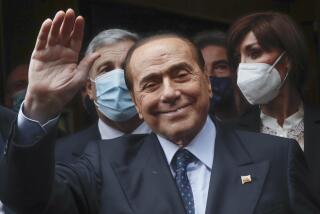Italy Premier Quits, Signaling End of Era : Government: The 73-year-old former central bank governor’s technocrat regime had seen the country through a period of critical change.
- Share via
ROME — Prime Minister Carlo Azeglio Ciampi resigned Thursday, sounding the death knell for an old-pals political system that transported Italy from war-racked fascism to prosperous but corruption-scarred democracy.
Italy’s 52nd postwar government passed quietly in a half-hour meeting on a springlike afternoon between Ciampi and his friend President Oscar Luigi Scalfaro at the Quirinale Palace overlooking the Eternal City.
But there was great ferment beneath the surface: With mainstay parties tarred by unprecedented scandal and the political center up for grabs, spring elections could bring left-wing parties to national power for the first time--chief among them the former Italian Communist Party.
Scalfaro received without public comment the resignation of the 73-year-old former central bank governor, whose eight-month technocrat government has weathered a period of critical change while enacting some remarkable reforms.
The Italian president meets leaders of the Senate and Chamber of Deputies today as a prelude to dissolving Parliament. Observers believe Scalfaro will ask Ciampi to remain at the head of a caretaker government until elections are held.
Most analysts expect Scalfaro to set the election for March 27 and to have completed the transition details by Sunday so that Italy starts the business week with a caretaker government in place.
The forcing of an early election underpinned an opposition no-confidence motion in Parliament, which Ciampi called “an invitation to resign.” The motion was withdrawn Thursday after two days of debate, but by then Ciampi had decided to go even without it.
The independent, low-key banker who had never held political office or had any party affiliation has always portrayed himself as a transition figure.
Scalfaro named him as a compromise leader acceptable to all sides after a referendum last April pulled the rug from under center-right political parties that have ruled Italy without interruption since World War II.
The referendum demanded electoral reform to replace a proportional system that resulted in an unending procession of weak coalition governments. They in turn produced a system of party control that extended not only to Parliament but also to a national web of state-controlled enterprises from banks to television channels to huge industrial conglomerates.
The system came to depend on a foundation of illegal patronage and kickbacks for government contracts. A two-year investigation of massive political bribery has uncovered billions of dollars in nationwide payoffs involving all major parties and many of Italy’s largest companies.
*
More than 3,000 business people, politicians and bureaucrats are under investigation or in jail. More than 200 senators and deputies must face magistrates with hard questions to ask once their present parliamentary immunity expires.
Under Ciampi, a mulish Parliament whose majority parties have lost public confidence reluctantly approved a reform under which three-quarters of the seats in both the chamber and the senate will be filled by the candidate who wins the most votes in a given district. The change is intended to place more responsibility on individual politicians and loosen the vise-grip of party barons.
“The path is cleared,” Ciampi told a year-end news conference, saying that he would leave office once the 1994 budget had been approved. Opposition forces joined with Ciampi supporters to pass it and new taxes aimed at reducing the largest state deficit and debt in the European Union (formerly the European Community).
Along the way, Ciampi’s government also launched privatization of large government holdings, beginning with banks. It began reform of Italy’s bloated and inept public administration and won agreement on labor costs that pleased entrepreneurs but alarmed unions.
Inflation sank to around 4%, its lowest level in memory.
The Christian Democrats, the largest party and the dominant partner in every postwar government, had hoped to delay elections until June to give themselves a chance to regroup from scandal.
But pressures for an early vote grew inevitable after municipal elections in December, in which candidates supported by the Democratic Party of the Left, the former Communists, swept major cities.
Votes for candidates backed by Christian Democrats and their coalition allies shrank embarrassingly almost everywhere. An insurgent northern-based populist movement, the Northern League, and the neo-fascist Italian Social Movement, profited from the protest vote.
Polls show that the former Communists, who now call themselves social democrats, are the likely victors of a spring election. In postwar decades, Italian Communists served as mayors of virtually every major Italian city, but while the party was Italy’s second-largest, it was always a bridesmaid--denied a share of national power in all 52 governments.
More to Read
Sign up for Essential California
The most important California stories and recommendations in your inbox every morning.
You may occasionally receive promotional content from the Los Angeles Times.













